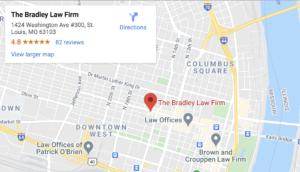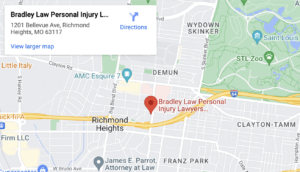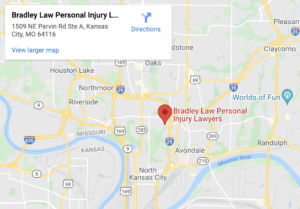
Personal injury laws cover a wide variety of accidents and the injuries caused by them.
If you have been in an accident, and you are wondering if you can file a lawsuit, you should know that people often file personal injury claims for injuries they got that involve:
- Auto accidents
- Slip and fall accidents
- Nursing home abuses
- Defective drugs or medical devices
- Construction accidents
- Dog bites
- Workplace accidents
Many other situations could result in a personal injury case. Almost any injury caused by another party’s negligence or wrongdoing can result in a personal injury claim.
Two of the most frequently asked questions are: 1) how long will it take to settle my accident or injury claim?; and 2) how much is my personal injury claim worth? Our St. Louis injury attorney will work diligently to settle your case as quickly as possible for the maximum compensation available for your claim.
The length of time it takes to settle a claim and your case’s worth depends on the case’s facts. Let’s discuss some of the factors that impact a case’s worth.
Types of Damages You Sustained Because of Your Accident or Injury
The types of damages you sustained are among the most significant factors used to calculate a personal injury claim’s value.
There are three types of damages that you might receive after being injured:
Economic Damages
Economic damages are the total financial losses you sustained because of the accident or your injury. Medical bills, property damage, income loss, and other out-of-pocket expenses are included in economic damages.
These damages can include the cost of past medical treatment and ongoing medical care. You may also be entitled to future loss of income or decreases in earning potential.
The damages award depends on what you can prove. You must have evidence proving each financial loss or expense. Therefore, it is crucial to keep each receipt, bill, invoice, or other document evidencing how much you paid or lost because of the accident.
Non-Economic Damages
Pain and suffering damages are different from economic damages. Both types of damages are compensatory damages because they “compensate” an injured person for losses associated with the accident.
However, non-economic damages compensate you for the emotional, mental, and physical suffering you experience because of the accident.
Damages in this category might include:
- Pain and discomfort
- Anxiety, depression, and PTSD
- Scarring and disfigurement
- Embarrassment and inconvenience
- Disabilities and permanent impairments
- Loss of enjoyment of life
- Decreases in quality of life
There is not a bill or invoice we can use to prove your non-economic damages. Neither the courts nor the state code provides a standard formula for calculating pain and suffering damages. Many insurance companies, personal injury lawyers, and juries use the multiplier method to value pain and suffering damages.
The parties agree to a number between 1.5 and five, depending on the facts of the case. Your lawyer argues for the highest number while the insurance company argues for the lowest number. The number is multiplied by your economic damages to calculate a value for pain and suffering damages. If the case goes to trial, then the jury would choose the number.
Factors that impact the choice of a multiplier include:
- The type of injuries sustained in the accident
- Whether you sustained a permanent impairment or disability
- The length of your recovery
- The prognosis submitted by your physician
- Whether you have scarring or disfigurement
In most cases, sustaining a disabling condition or disfigurement increases the multiplier. The type of injury can impact the multiplier. A claim involving a broken leg that resulted in surgery and four months out of work will have a higher multiplier than a claim that involves a case of whiplash that keeps the person out of work for three weeks.
Punitive Damages
Punitive damages are rarely awarded in a personal injury case. This type of damage is intended to punish a defendant instead of compensating the victim for damages.
According to Missouri law, punitive damages may be awarded if:
- The defendant intentionally harmed the victim without just cause; OR
- The defendant acted with a flagrant and deliberate disregard for the safety of others.
For example, assaulting another person might be considered intentional harm without justification. Driving under the influence or driving 75 mph through a school zone might be considered a flagrant and deliberate disregard for the safety of others.
Other Factors That Impact the Value of Your Personal Injury Case
Three other factors could have a substantial effect on how much your personal injury case is worth:
Comparative Negligence
Allegations of comparative negligence could reduce the value of your injury claim. Missouri uses the pure comparative fault standard in personal injury cases. If an injured person contributes to the cause of the accident or injury, the person can still recover compensation for their damages.
However, their compensation is reduced by their percentage of fault for the accident. In other words, if a jury finds that you are 50 percent at fault for the cause of a car accident, you can only recover 50 percent of the value of your damages.
If an insurance adjuster or someone associated with the other driver suggests you could be partially at fault for an accident, you should contact a lawyer immediately. Insurance companies often use allegations of comparative negligence to reduce the value of an injury claim.
Strength of Your Evidence
You must prove negligence by the other party to hold the party legally responsible for your damages. Negligence occurs when a party fails to act with the same level of care that a reasonable person would have used in the same or similar situation. If your evidence is weak, the value of your claim may decrease.
The insurance company may offer to settle the claim because it does not want to take its chance in court. However, it may not be willing to pay full value for the claim because it knows you do not have a strong enough case to take to court.
Availability of Insurance Coverage
Missouri drivers must have a minimum level of car insurance. A driver must have at least $25,000 in coverage for bodily injury. Many drives carry the minimum coverage amount to save money on insurance premiums.
Unfortunately, a simple surgery and a few days in the hospital can result in well over $25,000 in medical bills. In this case, there would be no insurance money to compensate you for damages other than medical costs.
In this instance, you can file a personal injury lawsuit against the other driver. However, if the other driver does not have money or assets to satisfy the judgment, you could end up with nothing from the lawsuit.
You can protect yourself and your family by carrying maximum amounts of underinsured motorist coverage (UIM). If the at-fault driver’s insurance policy does not compensate you fully for your damages, you can file a claim with your insurance company. Your UIM policy compensates you for the difference between the value of your damages and the amount you received from the other driver’s insurance company.
Contact Our Missouri Personal Injury Lawyers for a Free Consultation
Receiving legal advice from an experienced personal injury attorney can help reduce your stress level after an accident. Instead of trying to handle your accident case on your own, let our experienced legal team at Bradley Law Personal Injury Lawyers fight for a fair settlement. Read about car accident damages for more specific information on those cases.




